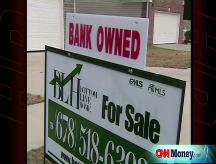Six months, 343,000 lost homes
Through the first half of 2008, the foreclosure rate shows little sign of letting up.
NEW YORK (CNNMoney.com) -- The number of Americans losing their homes to foreclosure continued to soar in June, according to a report released Thursday.
RealtyTrac, an online marketer of foreclosed properties, reported that lenders repossessed 71,563 homes in June. A year ago, just 26,369 homes were taken back.
During the first six months of 2008, 343,159 Americans lost their homes, up 136% from 145,696 recorded during the same period in 2007.
The report revealed that foreclosure filings of all types, including notices of default, notices of auction sales and bank repossessions, rose 53% from June 2007, to 252,363. For the first six months, total filings rose 56% to 1.4 million.
"June was the second straight month with more than a quarter-million properties nationwide receiving foreclosure filings," said James Saccacio, chief executive officer of RealtyTrac.
There was a shred of good news: When compared with May, filings declined 3%.
Part of that decline may be traced to the actions of states, including Maryland and Massachusetts, that have put moratoriums on foreclosures, according to Rick Sharga, a spokesman for RealtyTrac.
"Massachusetts put a 90-day hold on new foreclosures," he said, "and filings dropped 3% there over last year."
But big increases were more common. In 13 states, filings more than doubled from a year earlier, including in Arizona, Nebraska and Oregon.
"The year-over-year increase of more than 50% indicates we have not yet reached the top of this foreclosure cycle," said Saccacio.
Adding to foreclosure woes is that home prices have been falling all year, down more than 14% in the first quarter, according to the latest figures from the S&P Case-Shiller Home Price Index.
Price declines strip homeowners of equity, making many mortgage borrowers owe more than their homes are worth. When they're underwater, they can't borrow against home equity to help out during a rough financial stretch.
Underwater properties are hard to sell because any deal would be for a sum below the mortgage balance - the bank would have to agree to take a loss. Many of these "short sales" get turned down and wind up as bank-owned properties.
"The real explosion has been in bank repossessions," said Sharga. "There's really no place else for these places to go except back to the lenders when they're underwater."
Two things work against short sales, according to Duane LeGate, president of HouseBuyerNetwork.com, a short-sale specialist. One is there is often a question of who has authority over the loan. Mortgage servicers are loath to make decisions that will result in losses of mortgage principal of loans in investor pools, even if it means smaller losses than foreclosures produce.
The second is manpower. Servicers simply don't have the personnel to handle the volume of short-sale and other loss-mitigation requests they've been receiving. Delays in processing short sales can mean approvals come too late.
"We hear about all these streamlined mortgage lending programs," said LeGate. "Where are the streamlined processes to undo the mortgages they originated?"
Nevada led all states in the rate of foreclosure activity for the 17th consecutive month, with one filing for every 122 households, a total of 8,713. California had the most filings with 68,666, one for every 192 households.
Other states with very high foreclosure rates included Arizona, one for every 201 households, Florida (one for every 211), Michigan (one in 375) and Ohio (one in 382).
California had seven of the 10 metropolitan areas worst hit by foreclosure. Stockton had one for every 72 households - more than six times the national average of one for every 501 households. Merced, was second with one for every 77 households, and Modesto - one in 86 - was third.
Cape Coral-Fort Myers, Fla., where one in every 91 households received a foreclosure filing, had the fourth highest rate. In Las Vegas, the only city outside of California and Florida with a foreclosure rate ranking among the top 10, one in 99 households received a foreclosure filing in June. ![]()




